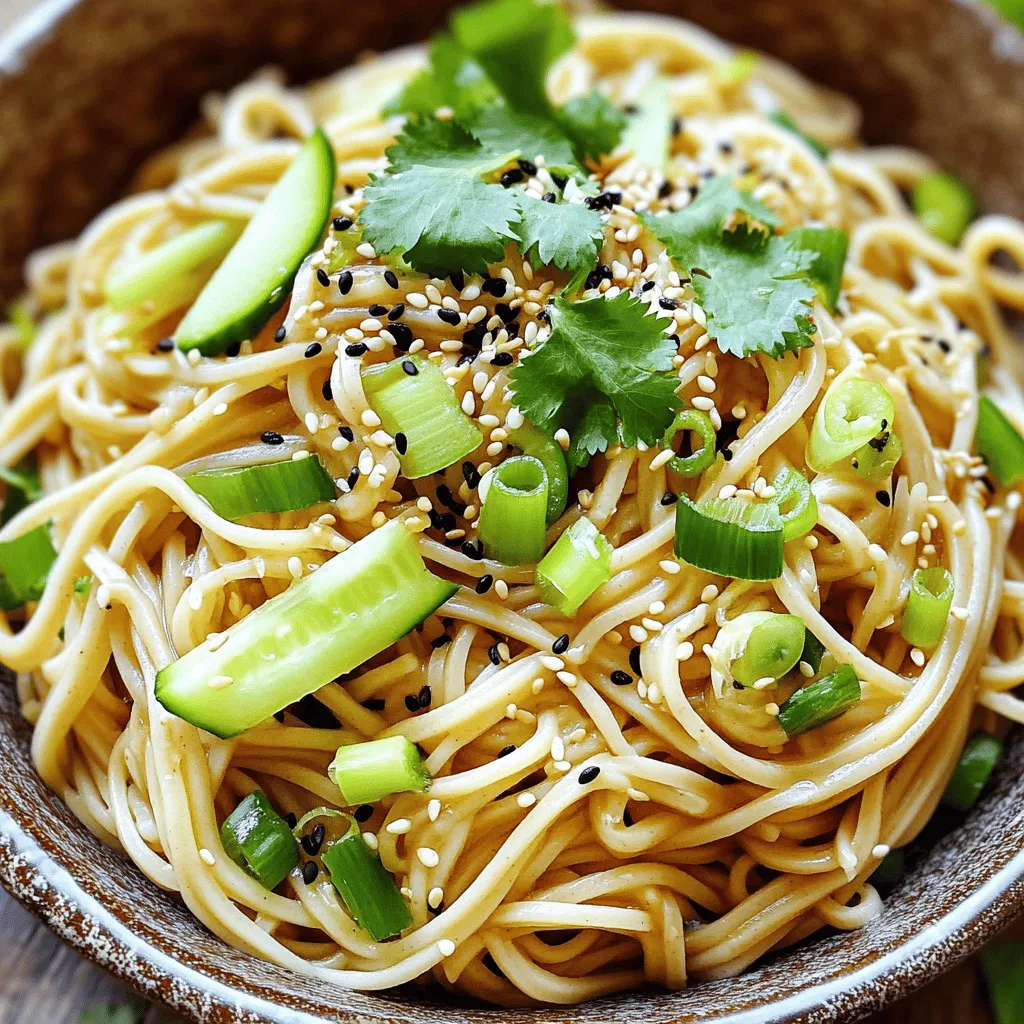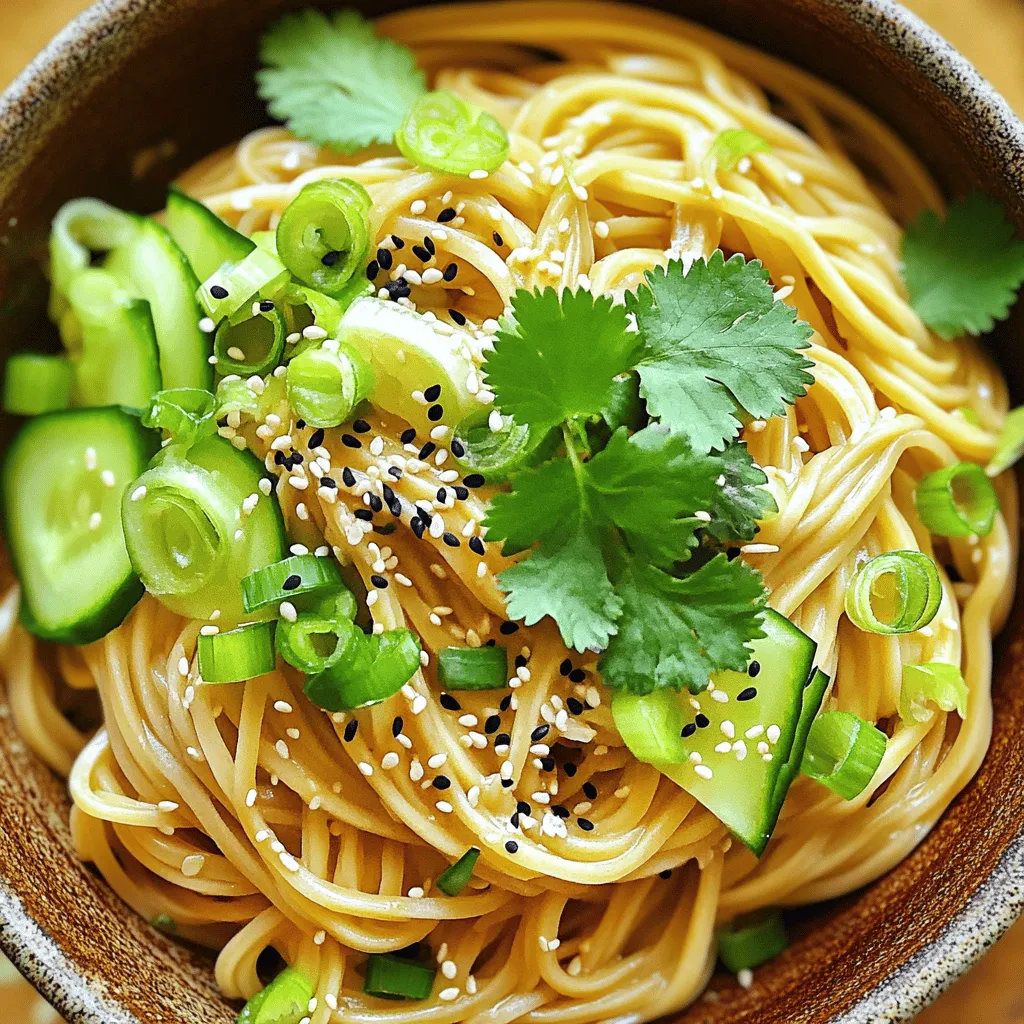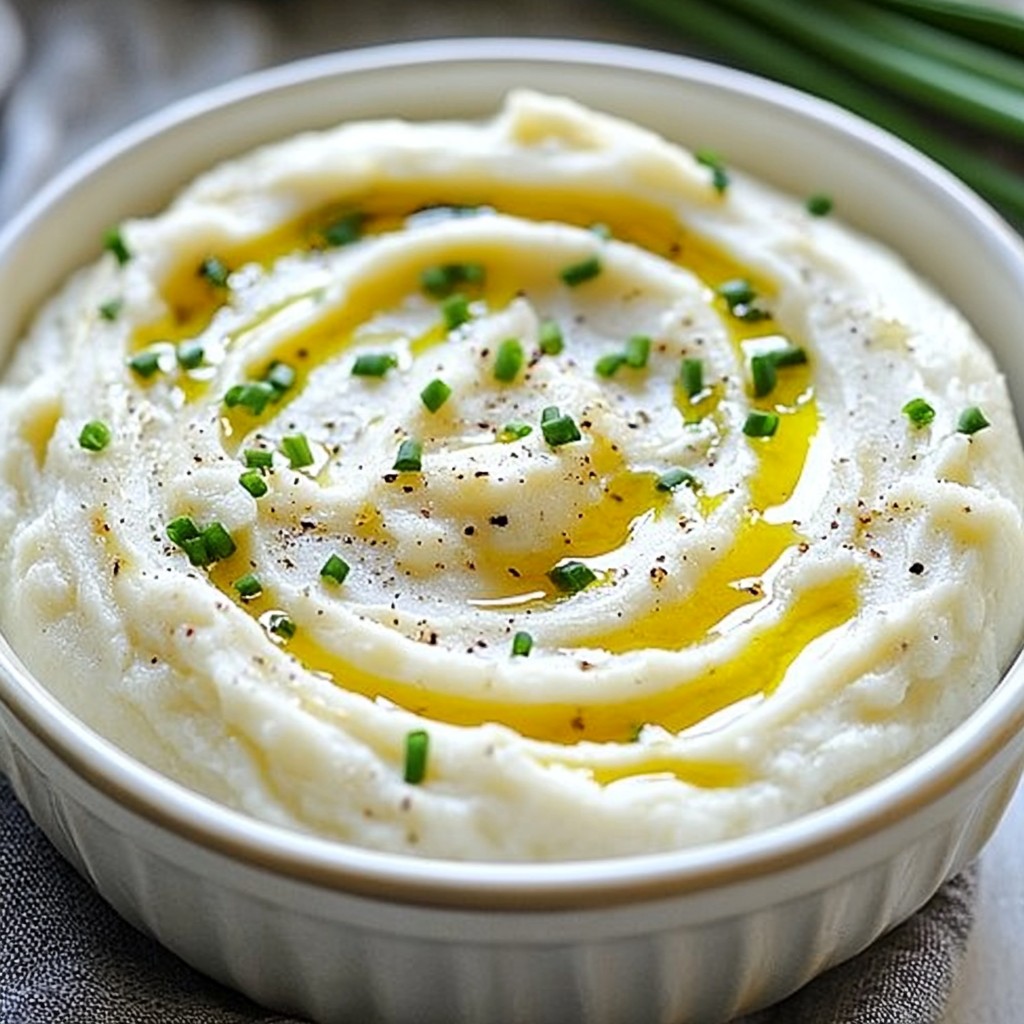Looking for a simple yet flavorful dish? You’re in the right place! In this Savory Sesame Garlic Soba Noodles Easy Recipe Guide, I’ll show you how to whip up this tasty meal in no time. With just a few ingredients, you will enjoy a delightful blend of sesame and garlic flavors. Get ready to impress your friends and family with a dish that’s not only easy to make but also fun to customize! Let’s dive in!
Ingredients
Complete Ingredients List
To make Sesame Garlic Soba Noodles, gather these ingredients:
– 200g soba noodles
– 3 tablespoons sesame oil
– 4 cloves garlic, minced
– 2 tablespoons soy sauce (or tamari for gluten-free)
– 1 tablespoon rice vinegar
– 2 teaspoons sesame seeds (white and black mix)
– 1/2 teaspoon red pepper flakes (adjust to taste)
– 2 green onions, chopped
– 1 small cucumber, julienned
– Fresh cilantro for garnish
Measurement Conversions
If you need to convert measurements, here are some quick tips:
– 1 tablespoon equals 15 milliliters.
– 1 teaspoon equals 5 milliliters.
– 200 grams of soba noodles is about 7 ounces.
– For cups, 1 tablespoon is about 0.06 cups.
Having these conversions helps if you only have measuring cups or a scale.
Ingredient Substitutions
You can swap out some ingredients if needed:
– Use olive oil instead of sesame oil for a lighter flavor.
– If you don’t have soy sauce, use coconut aminos for a soy-free option.
– For extra crunch, try chopped nuts instead of sesame seeds.
– If you lack fresh cilantro, parsley makes a good substitute.
These substitutions keep the dish tasty and fresh, even if you run out of something.
Step-by-Step Instructions
Cooking the Soba Noodles
To start, fill a large pot with water. Bring it to a boil over high heat. Once the water is bubbling, add 200 grams of soba noodles. Cook them according to the package directions. This usually takes about five to seven minutes. Stir the noodles occasionally so they don’t stick together. When they are al dente, drain them in a colander. Rinse the noodles with cold water to stop the cooking. This also helps remove extra starch.
Preparing the Sauce
While the noodles cook, you can make the sauce. In a small bowl, add three tablespoons of sesame oil. Then, add four cloves of minced garlic. Next, mix in two tablespoons of soy sauce. If you want a gluten-free option, use tamari instead. Add one tablespoon of rice vinegar and two teaspoons of sesame seeds to the bowl. For some heat, include half a teaspoon of red pepper flakes. Whisk all these together until they blend well. Set the sauce aside for later.
Mixing and Serving the Noodles
Once your noodles are ready, it’s time to mix them with the sauce. In a large mixing bowl, combine the cooked soba noodles and the sauce. Toss everything well so the noodles get coated evenly. Next, add in two chopped green onions and a small julienned cucumber. Mix gently to combine. Now, taste the noodles. If you want more flavor, adjust with extra soy sauce or red pepper flakes. When ready to serve, plate the noodles. Finish by garnishing them with a sprinkle of sesame seeds and fresh cilantro. Enjoy your meal!
Tips & Tricks
Perfecting the Noodle Texture
To achieve the best texture for soba noodles, cook them just right. Bring a large pot of water to a rolling boil. Add the soba noodles and cook for about 5-7 minutes. Always check the package for exact times. You want them al dente, so they hold up well when mixed with the sauce. Once cooked, drain and rinse them under cold water. This step removes extra starch and stops the cooking process. It keeps the noodles from getting mushy.
Enhancing Flavor Profiles
The key to great flavor is in the sauce. Combine sesame oil, minced garlic, soy sauce, rice vinegar, and red pepper flakes. Whisk these ingredients well in a small bowl. The sesame oil gives richness, while the garlic adds depth. Adjust the red pepper flakes for spice to fit your taste. If you want a touch of sweetness, consider adding a bit of honey or maple syrup. This balance makes the dish pop!
Presentation Ideas for Serving
A beautiful plate can make any dish shine. Start by plating the soba noodles in a large bowl or on a plate. Sprinkle the sesame seeds on top for a nice crunch. Add fresh cilantro leaves for color and aroma. The julienned cucumber and chopped green onions can be arranged on the side for a fresh look. For a fun twist, serve the noodles in individual bowls with a lime wedge for a dash of citrus. This adds both flair and flavor!

Variations
Adding Proteins (Tofu, Chicken, Shrimp)
You can easily add proteins to your sesame garlic soba noodles. Tofu is a great choice for a vegetarian option. Cube firm tofu, then pan-fry it until golden. Add it to the noodles for extra texture. If you prefer chicken, slice it into thin strips. Cook it in a hot pan until it’s fully cooked. Shrimp also works well. Just sauté them until they turn pink. All these proteins boost flavor and make the dish more filling.
Vegetarian and Vegan Alternatives
For a vegan twist, use vegetable broth instead of chicken broth. You can swap soy sauce for tamari if you want it gluten-free. Use maple syrup instead of honey for sweetness. Add chickpeas or lentils for protein. These options make the dish rich and satisfying without losing flavor.
Different Vegetable Add-Ins
You can customize your soba noodles with many vegetables. Try adding bell peppers for crunch and color. Broccoli is also a great choice; just steam it lightly before mixing in. Carrots, shredded or julienned, add sweetness. You can even toss in snap peas for a fresh bite. These veggies not only enhance flavor, but they also make your meal more colorful and nutritious.
Storage Info
How to Store Leftovers
To keep your sesame garlic soba noodles fresh, place leftovers in an airtight container. Make sure the noodles cool down before sealing. Store them in the fridge for up to three days. This way, you can enjoy them later without losing flavor.
Reheating Instructions
When you’re ready to eat, reheating is easy. Place the noodles in a pan over low heat. Add a splash of water or soy sauce to prevent sticking. Stir occasionally until warmed through. You can also use a microwave. Heat in short bursts, stirring in between, until hot.
Freezing Tips for Long-Term Storage
If you want to save your soba noodles for longer, freezing is a great option. First, store the noodles in a freezer-safe container. You can also use freezer bags. Just make sure to remove as much air as possible. They will stay good for up to three months. When ready to eat, thaw in the fridge overnight and reheat as needed.
FAQs
How do I make Soba Noodles gluten-free?
You can easily make soba noodles gluten-free by choosing a brand made from 100% buckwheat. Many brands mix buckwheat with wheat, so check labels carefully. Look for “gluten-free” on the package. Tamari is a great soy sauce to use in this recipe since it is usually gluten-free too.
Can I prepare Sesame Garlic Soba Noodles ahead of time?
Yes, you can prepare these noodles ahead of time. Cook the noodles and sauce, then mix them together. Store them in the fridge for up to three days. When ready, just reheat in a pan with a splash of water. This keeps them moist and tasty.
What can I substitute for sesame oil?
If you don’t have sesame oil, you can use olive oil or avocado oil. These oils have a milder flavor but still work well. You might miss the nutty taste, but the dish will still be delicious. You can also try a mix of peanut oil and a bit of toasted sesame oil for a twist.
This blog post covered the ingredients, cooking steps, and tips for making sesame garlic soba noodles. You learned about ingredient lists, replacements, and cooking methods. I shared ways to enhance flavors and different serving ideas. You can add proteins and veggies for extra nutrition, plus tips on storing leftovers.
Soba noodles are simple to make and customize. Enjoy experimenting with your own flavors. Happy cooking!




